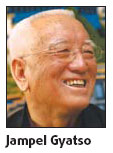When Jampel Gyatso first caught a glimpse of the yellow veil sheltering the Dalai Lama at the Potala Palace in 1951, the 13-year-old would have never dreamed that only four years later, he would be an interpreter for him as well as start a life-long friendship with the Panchen Lama.
 Now 71, the renowned Tibetan scholar looks back on the historic events he witnessed with composure. With silver hair and graying eyebrows, the tall, lanky man has a firm handshake and recalls distant days in amazing detail. This year marks the 50th anniversary of Tibet's Democratic Reform.
Now 71, the renowned Tibetan scholar looks back on the historic events he witnessed with composure. With silver hair and graying eyebrows, the tall, lanky man has a firm handshake and recalls distant days in amazing detail. This year marks the 50th anniversary of Tibet's Democratic Reform.
As one of the few people who interpreted for both the Dalai Lama and the 10th Panchen Lama, Jampel found the former to be quiet and a voracious reader while the latter was lively and liked to seek inspiration through discussions.
It was around Oct 30, 1951 that Jampel first saw the Dalai Lama. He and other members of the PLA's song and dance troupe - Jampel had joined a year earlier at 12 - smoothed their ragged uniforms, tied red ribbons around their waists and danced their way to the foot of the Potala, where their commander, Zhang Guohua, presented gifts to the Dalai Lama.
After studying Tibetan language and culture in Lhasa for three years, Jampel and his comrades went to Chengdu in 1954 for further studies.
A few months later, the Dalai Lama arrived in Chengdu. Both he and the Panchen Lama were invited to attend the 1st National People's Congress in Beijing where they would discuss national affairs with Chairman Mao Zedong and other leaders.
Thanks to his linguistic gifts and hard work, Jampel was assigned to interpret for the Dalai Lama's mother, sister and brother.
"I was proud and honored as an emancipated man," recalls Jampel, who was born into an impoverished family with a Tibetan mother and a Han father in Batang, Sichuan's Garze Tibetan prefecture.
Fate soon brought Jampel on to the Dalai Lama's path again, this time even closer.
On his way back to Tibet, the Dalai Lama stopped at Chengdu and Chongqing. For two months, Jampel accompanied the Dalai Lama along with Thuwang, a Tibetan interpreter 10 years his senior.
After the May Day holiday in 1955, news arrived that Premier Zhou Enlai would visit the Dalai Lama; and Jampel was allowed to stay and witness the occasion.
Zhou was concerned that the roads to Tibet would be blocked by landslides, and ordered 40 new cross-country vehicles from the Soviet Union, so the Dalai Lama and Panchen Lama could return home safely.
When Zhou said that Chairman Mao's instructions - "unity and progress, more development" - should be the principle of Tibet's work, the Dalai Lama eagerly embraced the decision.
As Thuwang often went out at night for dancing, the Dalai Lama joked with Jampel: "Thuwang's feet are itching again. Let's liberate him." So it was left for Jampel to interpret the nightly lessons on revolutionary history taught by Liu Geping, vice-director of the United Work Front Department.
It was the Dalai Lama who asked for the lessons and took careful notes in beautiful handwriting with a Parker pen, Jampel observed.
After the Dalai Lama fled Lhasa amid riots on March 17, 1959, Jampel interpreted for Premier Zhou and the Panchen Lama during the 2nd National People's Congress in Beijing.
Zhou said the Tibet rebellion must be put down and entrusted the Panchen Lama to take up the responsibility of carrying out democratic reform. Jampel recalls that the Panchen Lama, then 21, was full of confidence.
Jampel remembers many special days, but perhaps the most dramatic one would be Jan 8, 1981, when he began studying the Tibetan epic King Gesar.
He rode a bike to a tranquil siheyuan courtyard in Dongzongbu Hutong near Jianguomen in Beijing. The doorman ushered him into a small study reserved for close acquaintances.
Soon a tall, big man strode in and addressed him as "bola" (friend). He was the 10th Panchen Lama, who was born the same year as Jampel.
The Panchen Lama invited Jampel to Tian'anmen Square and they laid a wreath at the Monument to the People's Heroes to commemorate Zhou, who died on the same day in 1976.
"There were only a few people whom the Panchen Lama ever called 'bola'," Jampel recalls.
(China Daily March 30, 2009)